Characteristics of Small and Medium-Sized Enterprises (SMEs) in the UK
VerifiedAdded on 2021/02/22
|16
|4405
|274
AI Summary
The provided document appears to be a collection of research papers, articles, and online resources related to small and medium-sized enterprises (SMEs) in the UK. The content covers various aspects such as the characteristics of SMEs, employment statistics, business sectors, entrepreneurship, social economy, and inclusive growth. It seems to be a comprehensive resource for students or researchers looking into the topic.
Contribute Materials
Your contribution can guide someone’s learning journey. Share your
documents today.
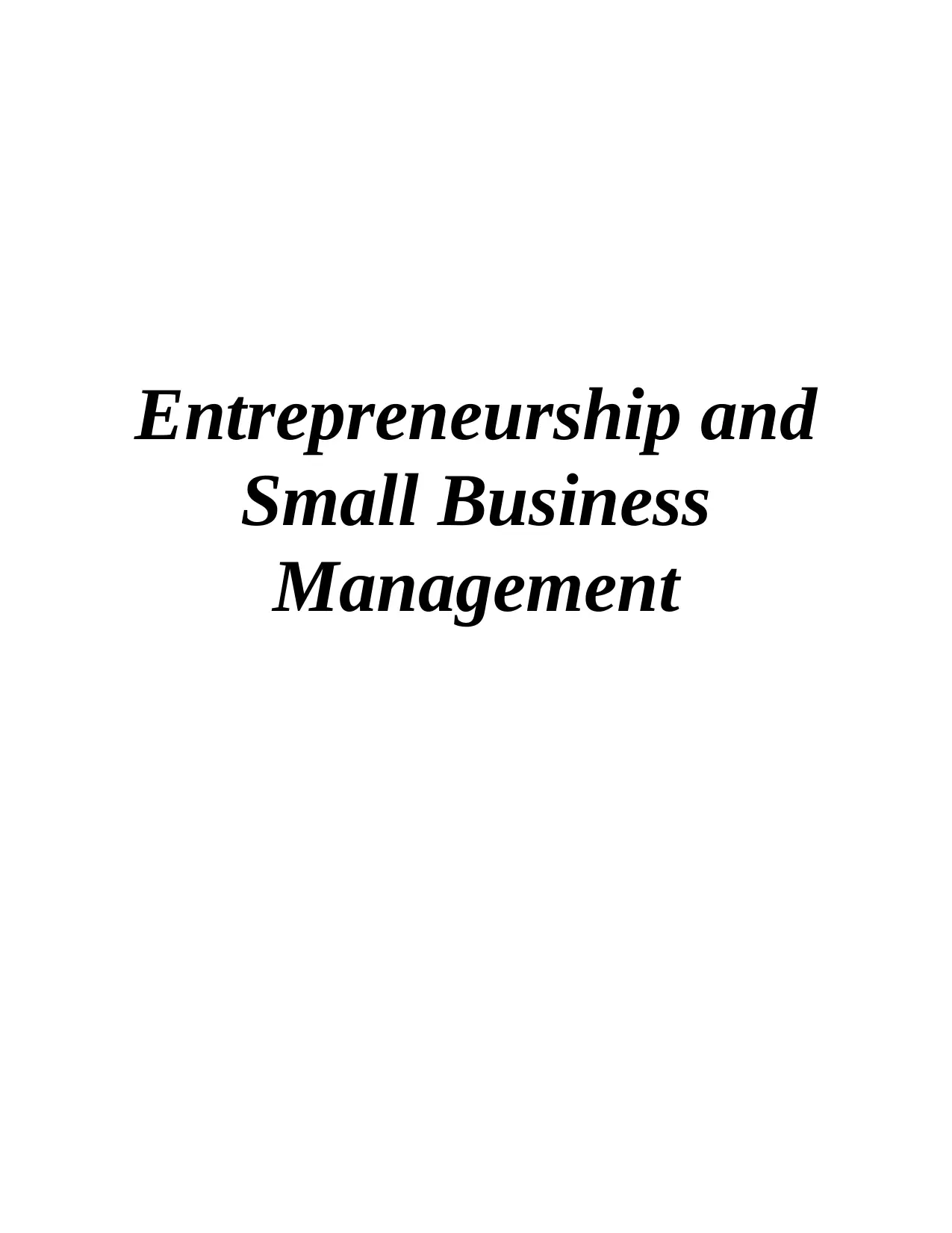
Entrepreneurship and
Small Business
Management
Small Business
Management
Secure Best Marks with AI Grader
Need help grading? Try our AI Grader for instant feedback on your assignments.
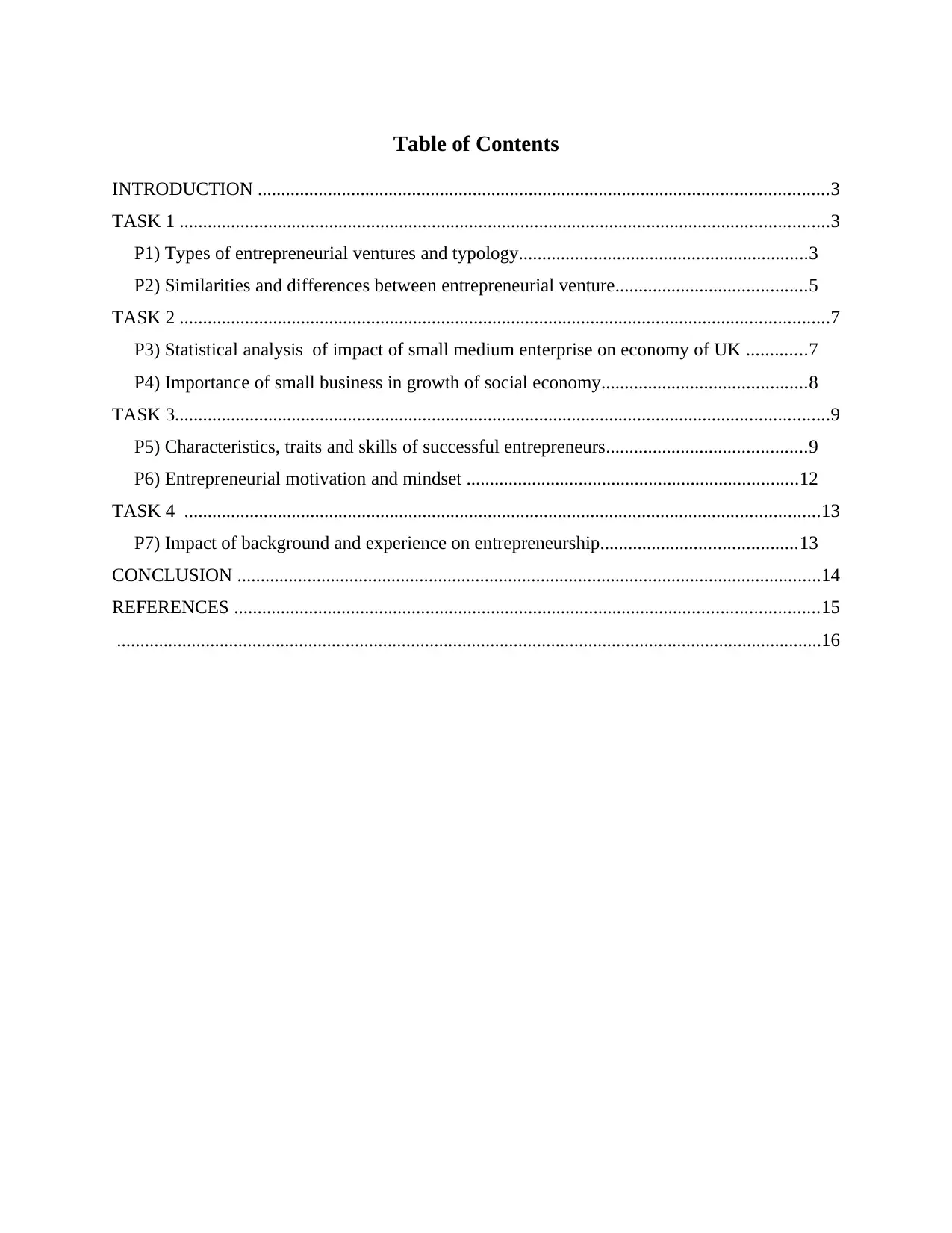
Table of Contents
INTRODUCTION ..........................................................................................................................3
TASK 1 ...........................................................................................................................................3
P1) Types of entrepreneurial ventures and typology..............................................................3
P2) Similarities and differences between entrepreneurial venture.........................................5
TASK 2 ...........................................................................................................................................7
P3) Statistical analysis of impact of small medium enterprise on economy of UK .............7
P4) Importance of small business in growth of social economy............................................8
TASK 3............................................................................................................................................9
P5) Characteristics, traits and skills of successful entrepreneurs...........................................9
P6) Entrepreneurial motivation and mindset .......................................................................12
TASK 4 ........................................................................................................................................13
P7) Impact of background and experience on entrepreneurship..........................................13
CONCLUSION .............................................................................................................................14
REFERENCES .............................................................................................................................15
.......................................................................................................................................................16
INTRODUCTION ..........................................................................................................................3
TASK 1 ...........................................................................................................................................3
P1) Types of entrepreneurial ventures and typology..............................................................3
P2) Similarities and differences between entrepreneurial venture.........................................5
TASK 2 ...........................................................................................................................................7
P3) Statistical analysis of impact of small medium enterprise on economy of UK .............7
P4) Importance of small business in growth of social economy............................................8
TASK 3............................................................................................................................................9
P5) Characteristics, traits and skills of successful entrepreneurs...........................................9
P6) Entrepreneurial motivation and mindset .......................................................................12
TASK 4 ........................................................................................................................................13
P7) Impact of background and experience on entrepreneurship..........................................13
CONCLUSION .............................................................................................................................14
REFERENCES .............................................................................................................................15
.......................................................................................................................................................16
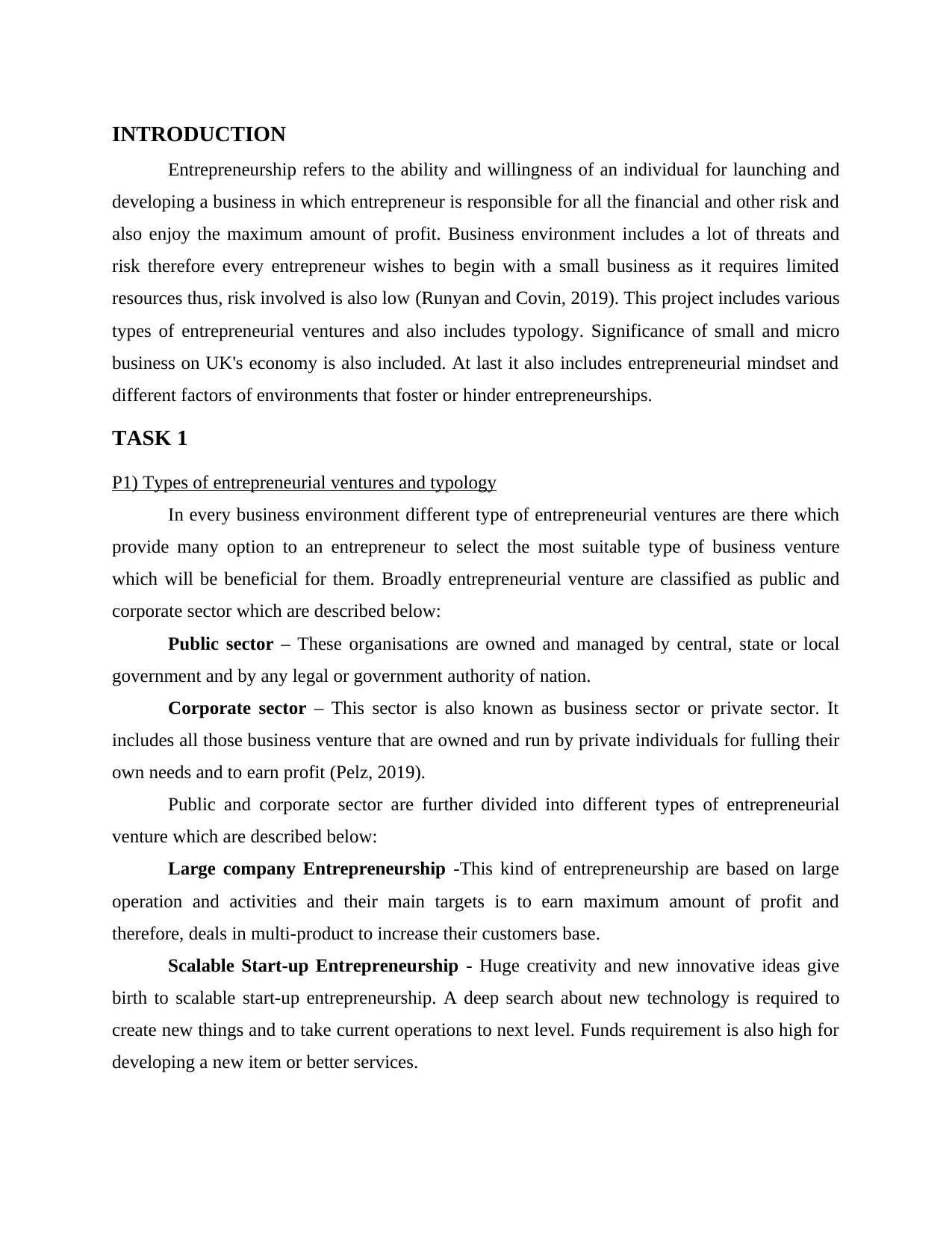
INTRODUCTION
Entrepreneurship refers to the ability and willingness of an individual for launching and
developing a business in which entrepreneur is responsible for all the financial and other risk and
also enjoy the maximum amount of profit. Business environment includes a lot of threats and
risk therefore every entrepreneur wishes to begin with a small business as it requires limited
resources thus, risk involved is also low (Runyan and Covin, 2019). This project includes various
types of entrepreneurial ventures and also includes typology. Significance of small and micro
business on UK's economy is also included. At last it also includes entrepreneurial mindset and
different factors of environments that foster or hinder entrepreneurships.
TASK 1
P1) Types of entrepreneurial ventures and typology
In every business environment different type of entrepreneurial ventures are there which
provide many option to an entrepreneur to select the most suitable type of business venture
which will be beneficial for them. Broadly entrepreneurial venture are classified as public and
corporate sector which are described below:
Public sector – These organisations are owned and managed by central, state or local
government and by any legal or government authority of nation.
Corporate sector – This sector is also known as business sector or private sector. It
includes all those business venture that are owned and run by private individuals for fulling their
own needs and to earn profit (Pelz, 2019).
Public and corporate sector are further divided into different types of entrepreneurial
venture which are described below:
Large company Entrepreneurship -This kind of entrepreneurship are based on large
operation and activities and their main targets is to earn maximum amount of profit and
therefore, deals in multi-product to increase their customers base.
Scalable Start-up Entrepreneurship - Huge creativity and new innovative ideas give
birth to scalable start-up entrepreneurship. A deep search about new technology is required to
create new things and to take current operations to next level. Funds requirement is also high for
developing a new item or better services.
Entrepreneurship refers to the ability and willingness of an individual for launching and
developing a business in which entrepreneur is responsible for all the financial and other risk and
also enjoy the maximum amount of profit. Business environment includes a lot of threats and
risk therefore every entrepreneur wishes to begin with a small business as it requires limited
resources thus, risk involved is also low (Runyan and Covin, 2019). This project includes various
types of entrepreneurial ventures and also includes typology. Significance of small and micro
business on UK's economy is also included. At last it also includes entrepreneurial mindset and
different factors of environments that foster or hinder entrepreneurships.
TASK 1
P1) Types of entrepreneurial ventures and typology
In every business environment different type of entrepreneurial ventures are there which
provide many option to an entrepreneur to select the most suitable type of business venture
which will be beneficial for them. Broadly entrepreneurial venture are classified as public and
corporate sector which are described below:
Public sector – These organisations are owned and managed by central, state or local
government and by any legal or government authority of nation.
Corporate sector – This sector is also known as business sector or private sector. It
includes all those business venture that are owned and run by private individuals for fulling their
own needs and to earn profit (Pelz, 2019).
Public and corporate sector are further divided into different types of entrepreneurial
venture which are described below:
Large company Entrepreneurship -This kind of entrepreneurship are based on large
operation and activities and their main targets is to earn maximum amount of profit and
therefore, deals in multi-product to increase their customers base.
Scalable Start-up Entrepreneurship - Huge creativity and new innovative ideas give
birth to scalable start-up entrepreneurship. A deep search about new technology is required to
create new things and to take current operations to next level. Funds requirement is also high for
developing a new item or better services.
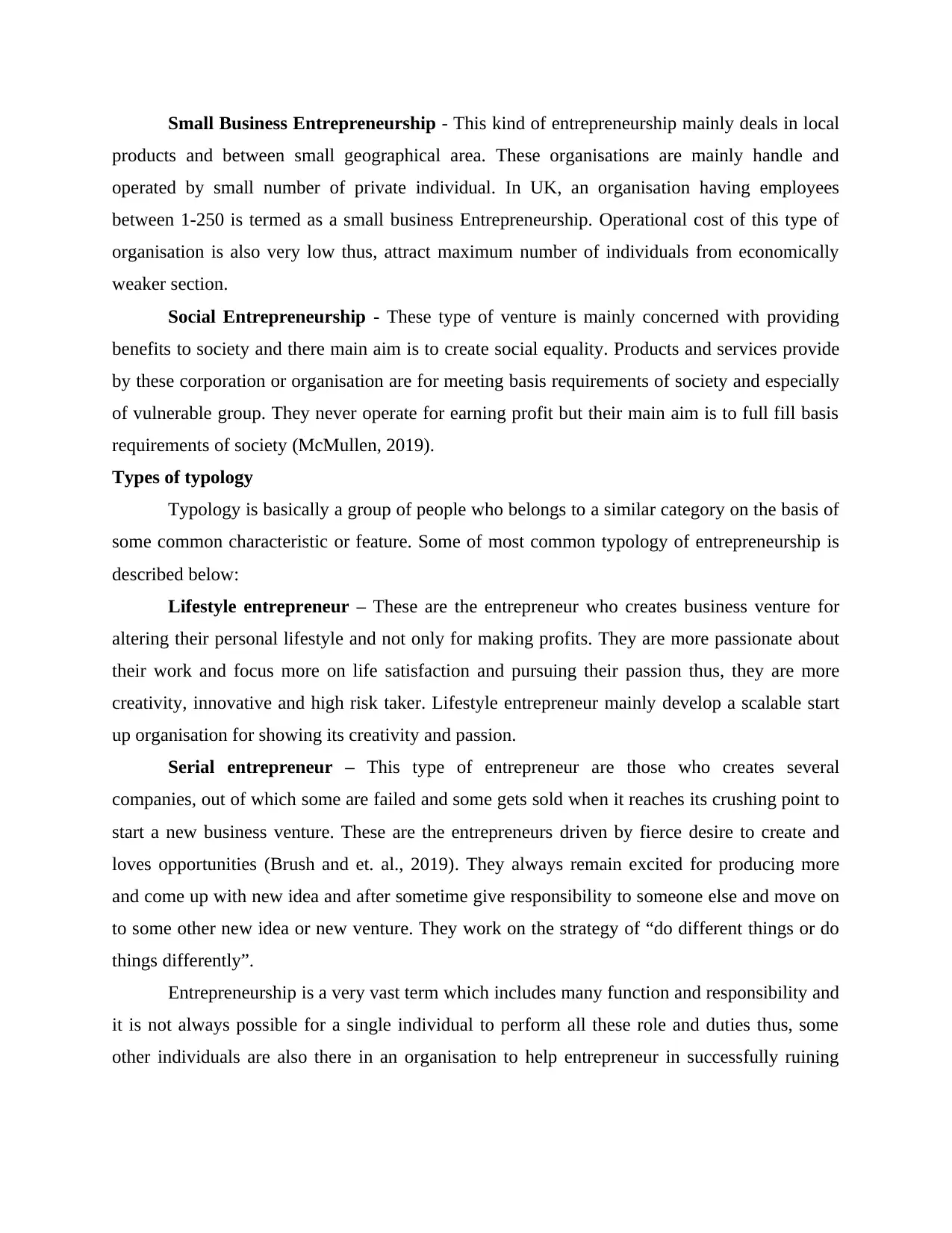
Small Business Entrepreneurship - This kind of entrepreneurship mainly deals in local
products and between small geographical area. These organisations are mainly handle and
operated by small number of private individual. In UK, an organisation having employees
between 1-250 is termed as a small business Entrepreneurship. Operational cost of this type of
organisation is also very low thus, attract maximum number of individuals from economically
weaker section.
Social Entrepreneurship - These type of venture is mainly concerned with providing
benefits to society and there main aim is to create social equality. Products and services provide
by these corporation or organisation are for meeting basis requirements of society and especially
of vulnerable group. They never operate for earning profit but their main aim is to full fill basis
requirements of society (McMullen, 2019).
Types of typology
Typology is basically a group of people who belongs to a similar category on the basis of
some common characteristic or feature. Some of most common typology of entrepreneurship is
described below:
Lifestyle entrepreneur – These are the entrepreneur who creates business venture for
altering their personal lifestyle and not only for making profits. They are more passionate about
their work and focus more on life satisfaction and pursuing their passion thus, they are more
creativity, innovative and high risk taker. Lifestyle entrepreneur mainly develop a scalable start
up organisation for showing its creativity and passion.
Serial entrepreneur – This type of entrepreneur are those who creates several
companies, out of which some are failed and some gets sold when it reaches its crushing point to
start a new business venture. These are the entrepreneurs driven by fierce desire to create and
loves opportunities (Brush and et. al., 2019). They always remain excited for producing more
and come up with new idea and after sometime give responsibility to someone else and move on
to some other new idea or new venture. They work on the strategy of “do different things or do
things differently”.
Entrepreneurship is a very vast term which includes many function and responsibility and
it is not always possible for a single individual to perform all these role and duties thus, some
other individuals are also there in an organisation to help entrepreneur in successfully ruining
products and between small geographical area. These organisations are mainly handle and
operated by small number of private individual. In UK, an organisation having employees
between 1-250 is termed as a small business Entrepreneurship. Operational cost of this type of
organisation is also very low thus, attract maximum number of individuals from economically
weaker section.
Social Entrepreneurship - These type of venture is mainly concerned with providing
benefits to society and there main aim is to create social equality. Products and services provide
by these corporation or organisation are for meeting basis requirements of society and especially
of vulnerable group. They never operate for earning profit but their main aim is to full fill basis
requirements of society (McMullen, 2019).
Types of typology
Typology is basically a group of people who belongs to a similar category on the basis of
some common characteristic or feature. Some of most common typology of entrepreneurship is
described below:
Lifestyle entrepreneur – These are the entrepreneur who creates business venture for
altering their personal lifestyle and not only for making profits. They are more passionate about
their work and focus more on life satisfaction and pursuing their passion thus, they are more
creativity, innovative and high risk taker. Lifestyle entrepreneur mainly develop a scalable start
up organisation for showing its creativity and passion.
Serial entrepreneur – This type of entrepreneur are those who creates several
companies, out of which some are failed and some gets sold when it reaches its crushing point to
start a new business venture. These are the entrepreneurs driven by fierce desire to create and
loves opportunities (Brush and et. al., 2019). They always remain excited for producing more
and come up with new idea and after sometime give responsibility to someone else and move on
to some other new idea or new venture. They work on the strategy of “do different things or do
things differently”.
Entrepreneurship is a very vast term which includes many function and responsibility and
it is not always possible for a single individual to perform all these role and duties thus, some
other individuals are also there in an organisation to help entrepreneur in successfully ruining
Secure Best Marks with AI Grader
Need help grading? Try our AI Grader for instant feedback on your assignments.
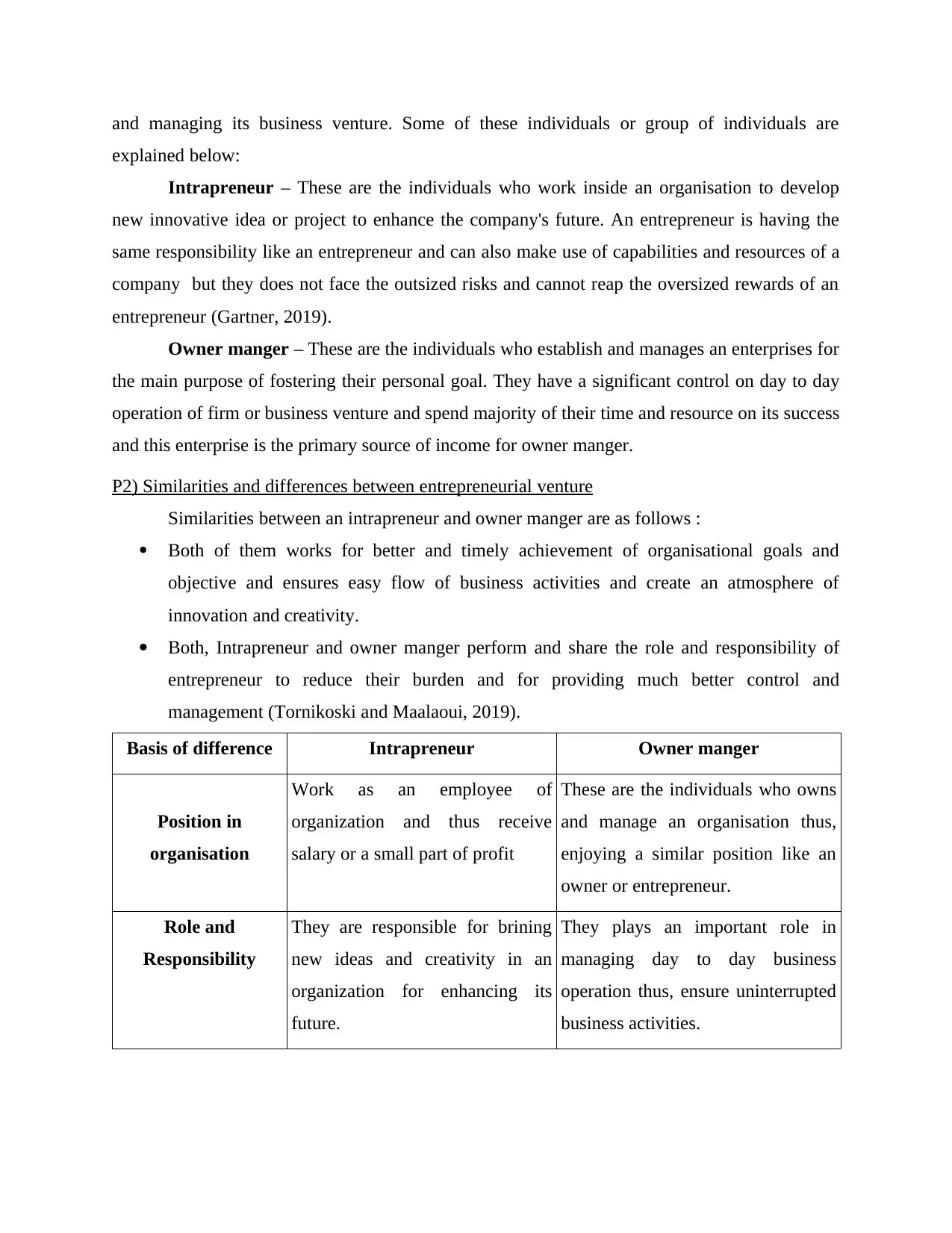
and managing its business venture. Some of these individuals or group of individuals are
explained below:
Intrapreneur – These are the individuals who work inside an organisation to develop
new innovative idea or project to enhance the company's future. An entrepreneur is having the
same responsibility like an entrepreneur and can also make use of capabilities and resources of a
company but they does not face the outsized risks and cannot reap the oversized rewards of an
entrepreneur (Gartner, 2019).
Owner manger – These are the individuals who establish and manages an enterprises for
the main purpose of fostering their personal goal. They have a significant control on day to day
operation of firm or business venture and spend majority of their time and resource on its success
and this enterprise is the primary source of income for owner manger.
P2) Similarities and differences between entrepreneurial venture
Similarities between an intrapreneur and owner manger are as follows :
Both of them works for better and timely achievement of organisational goals and
objective and ensures easy flow of business activities and create an atmosphere of
innovation and creativity.
Both, Intrapreneur and owner manger perform and share the role and responsibility of
entrepreneur to reduce their burden and for providing much better control and
management (Tornikoski and Maalaoui, 2019).
Basis of difference Intrapreneur Owner manger
Position in
organisation
Work as an employee of
organization and thus receive
salary or a small part of profit
These are the individuals who owns
and manage an organisation thus,
enjoying a similar position like an
owner or entrepreneur.
Role and
Responsibility
They are responsible for brining
new ideas and creativity in an
organization for enhancing its
future.
They plays an important role in
managing day to day business
operation thus, ensure uninterrupted
business activities.
explained below:
Intrapreneur – These are the individuals who work inside an organisation to develop
new innovative idea or project to enhance the company's future. An entrepreneur is having the
same responsibility like an entrepreneur and can also make use of capabilities and resources of a
company but they does not face the outsized risks and cannot reap the oversized rewards of an
entrepreneur (Gartner, 2019).
Owner manger – These are the individuals who establish and manages an enterprises for
the main purpose of fostering their personal goal. They have a significant control on day to day
operation of firm or business venture and spend majority of their time and resource on its success
and this enterprise is the primary source of income for owner manger.
P2) Similarities and differences between entrepreneurial venture
Similarities between an intrapreneur and owner manger are as follows :
Both of them works for better and timely achievement of organisational goals and
objective and ensures easy flow of business activities and create an atmosphere of
innovation and creativity.
Both, Intrapreneur and owner manger perform and share the role and responsibility of
entrepreneur to reduce their burden and for providing much better control and
management (Tornikoski and Maalaoui, 2019).
Basis of difference Intrapreneur Owner manger
Position in
organisation
Work as an employee of
organization and thus receive
salary or a small part of profit
These are the individuals who owns
and manage an organisation thus,
enjoying a similar position like an
owner or entrepreneur.
Role and
Responsibility
They are responsible for brining
new ideas and creativity in an
organization for enhancing its
future.
They plays an important role in
managing day to day business
operation thus, ensure uninterrupted
business activities.
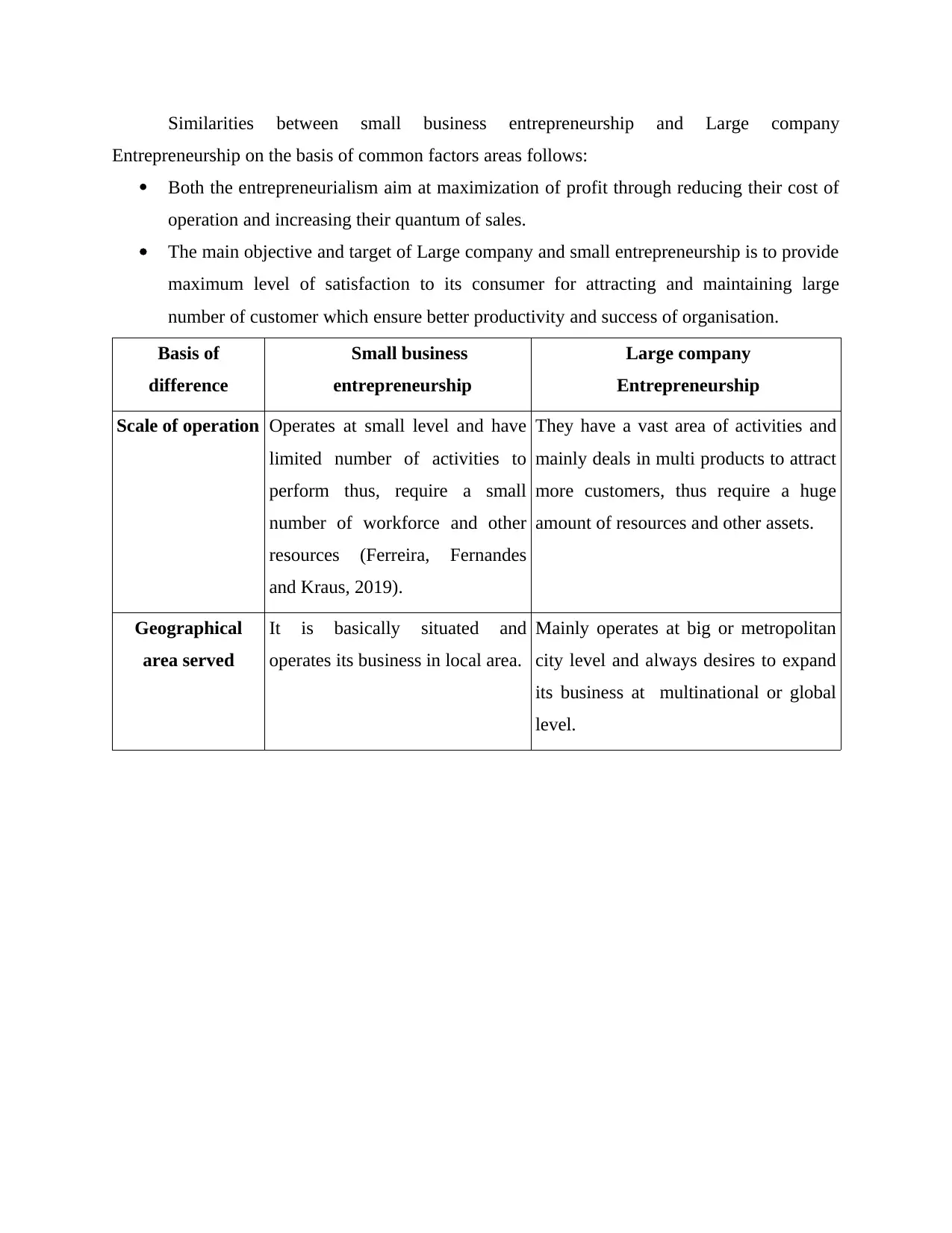
Similarities between small business entrepreneurship and Large company
Entrepreneurship on the basis of common factors areas follows:
Both the entrepreneurialism aim at maximization of profit through reducing their cost of
operation and increasing their quantum of sales.
The main objective and target of Large company and small entrepreneurship is to provide
maximum level of satisfaction to its consumer for attracting and maintaining large
number of customer which ensure better productivity and success of organisation.
Basis of
difference
Small business
entrepreneurship
Large company
Entrepreneurship
Scale of operation Operates at small level and have
limited number of activities to
perform thus, require a small
number of workforce and other
resources (Ferreira, Fernandes
and Kraus, 2019).
They have a vast area of activities and
mainly deals in multi products to attract
more customers, thus require a huge
amount of resources and other assets.
Geographical
area served
It is basically situated and
operates its business in local area.
Mainly operates at big or metropolitan
city level and always desires to expand
its business at multinational or global
level.
Entrepreneurship on the basis of common factors areas follows:
Both the entrepreneurialism aim at maximization of profit through reducing their cost of
operation and increasing their quantum of sales.
The main objective and target of Large company and small entrepreneurship is to provide
maximum level of satisfaction to its consumer for attracting and maintaining large
number of customer which ensure better productivity and success of organisation.
Basis of
difference
Small business
entrepreneurship
Large company
Entrepreneurship
Scale of operation Operates at small level and have
limited number of activities to
perform thus, require a small
number of workforce and other
resources (Ferreira, Fernandes
and Kraus, 2019).
They have a vast area of activities and
mainly deals in multi products to attract
more customers, thus require a huge
amount of resources and other assets.
Geographical
area served
It is basically situated and
operates its business in local area.
Mainly operates at big or metropolitan
city level and always desires to expand
its business at multinational or global
level.
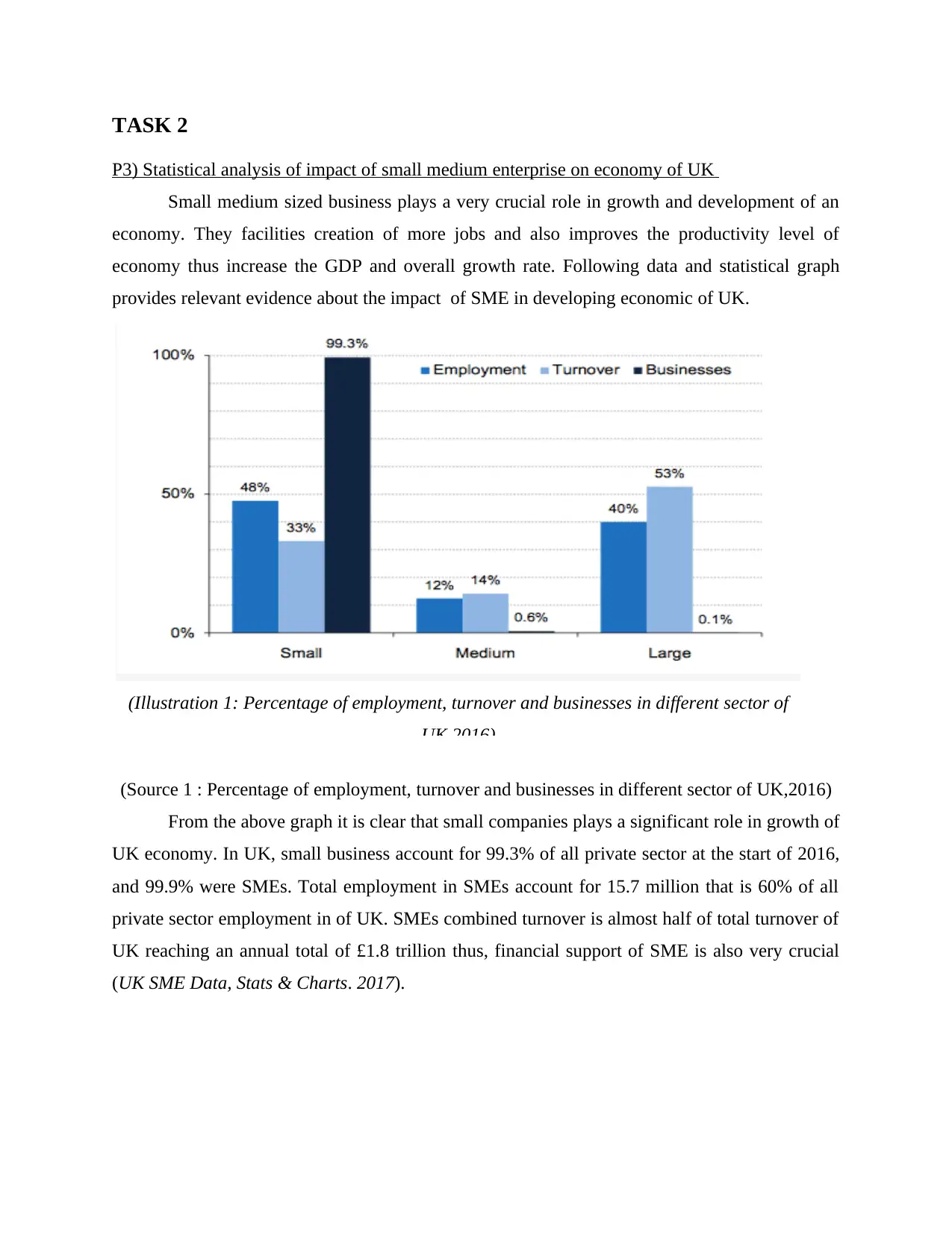
TASK 2
P3) Statistical analysis of impact of small medium enterprise on economy of UK
Small medium sized business plays a very crucial role in growth and development of an
economy. They facilities creation of more jobs and also improves the productivity level of
economy thus increase the GDP and overall growth rate. Following data and statistical graph
provides relevant evidence about the impact of SME in developing economic of UK.
(Source 1 : Percentage of employment, turnover and businesses in different sector of UK,2016)
From the above graph it is clear that small companies plays a significant role in growth of
UK economy. In UK, small business account for 99.3% of all private sector at the start of 2016,
and 99.9% were SMEs. Total employment in SMEs account for 15.7 million that is 60% of all
private sector employment in of UK. SMEs combined turnover is almost half of total turnover of
UK reaching an annual total of £1.8 trillion thus, financial support of SME is also very crucial
(UK SME Data, Stats & Charts. 2017).
(Illustration 1: Percentage of employment, turnover and businesses in different sector of
UK,2016)
P3) Statistical analysis of impact of small medium enterprise on economy of UK
Small medium sized business plays a very crucial role in growth and development of an
economy. They facilities creation of more jobs and also improves the productivity level of
economy thus increase the GDP and overall growth rate. Following data and statistical graph
provides relevant evidence about the impact of SME in developing economic of UK.
(Source 1 : Percentage of employment, turnover and businesses in different sector of UK,2016)
From the above graph it is clear that small companies plays a significant role in growth of
UK economy. In UK, small business account for 99.3% of all private sector at the start of 2016,
and 99.9% were SMEs. Total employment in SMEs account for 15.7 million that is 60% of all
private sector employment in of UK. SMEs combined turnover is almost half of total turnover of
UK reaching an annual total of £1.8 trillion thus, financial support of SME is also very crucial
(UK SME Data, Stats & Charts. 2017).
(Illustration 1: Percentage of employment, turnover and businesses in different sector of
UK,2016)
Paraphrase This Document
Need a fresh take? Get an instant paraphrase of this document with our AI Paraphraser
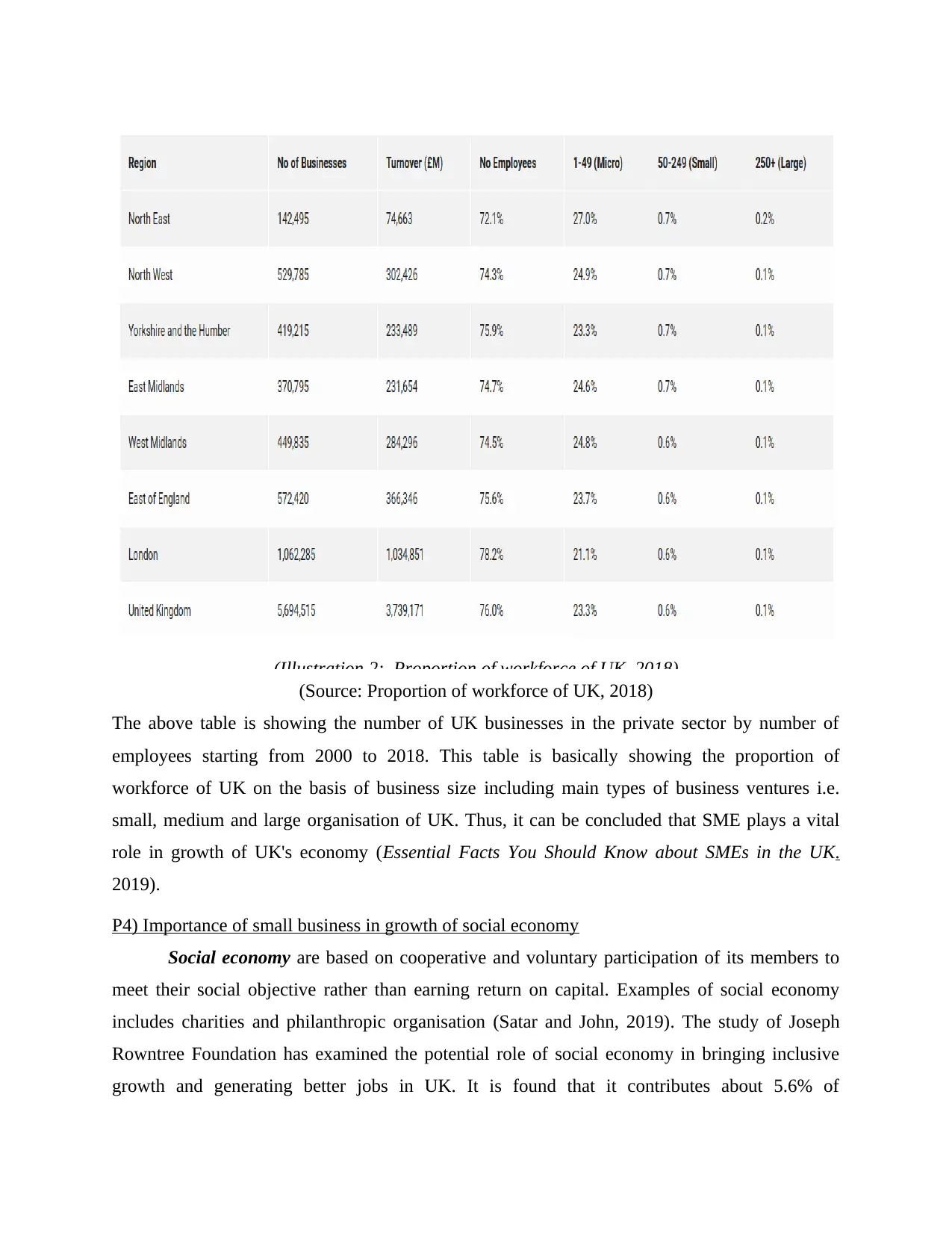
(Illustration 2: Proportion of workforce of UK, 2018)
(Source: Proportion of workforce of UK, 2018)
The above table is showing the number of UK businesses in the private sector by number of
employees starting from 2000 to 2018. This table is basically showing the proportion of
workforce of UK on the basis of business size including main types of business ventures i.e.
small, medium and large organisation of UK. Thus, it can be concluded that SME plays a vital
role in growth of UK's economy (Essential Facts You Should Know about SMEs in the UK.
2019).
P4) Importance of small business in growth of social economy
Social economy are based on cooperative and voluntary participation of its members to
meet their social objective rather than earning return on capital. Examples of social economy
includes charities and philanthropic organisation (Satar and John, 2019). The study of Joseph
Rowntree Foundation has examined the potential role of social economy in bringing inclusive
growth and generating better jobs in UK. It is found that it contributes about 5.6% of
(Source: Proportion of workforce of UK, 2018)
The above table is showing the number of UK businesses in the private sector by number of
employees starting from 2000 to 2018. This table is basically showing the proportion of
workforce of UK on the basis of business size including main types of business ventures i.e.
small, medium and large organisation of UK. Thus, it can be concluded that SME plays a vital
role in growth of UK's economy (Essential Facts You Should Know about SMEs in the UK.
2019).
P4) Importance of small business in growth of social economy
Social economy are based on cooperative and voluntary participation of its members to
meet their social objective rather than earning return on capital. Examples of social economy
includes charities and philanthropic organisation (Satar and John, 2019). The study of Joseph
Rowntree Foundation has examined the potential role of social economy in bringing inclusive
growth and generating better jobs in UK. It is found that it contributes about 5.6% of
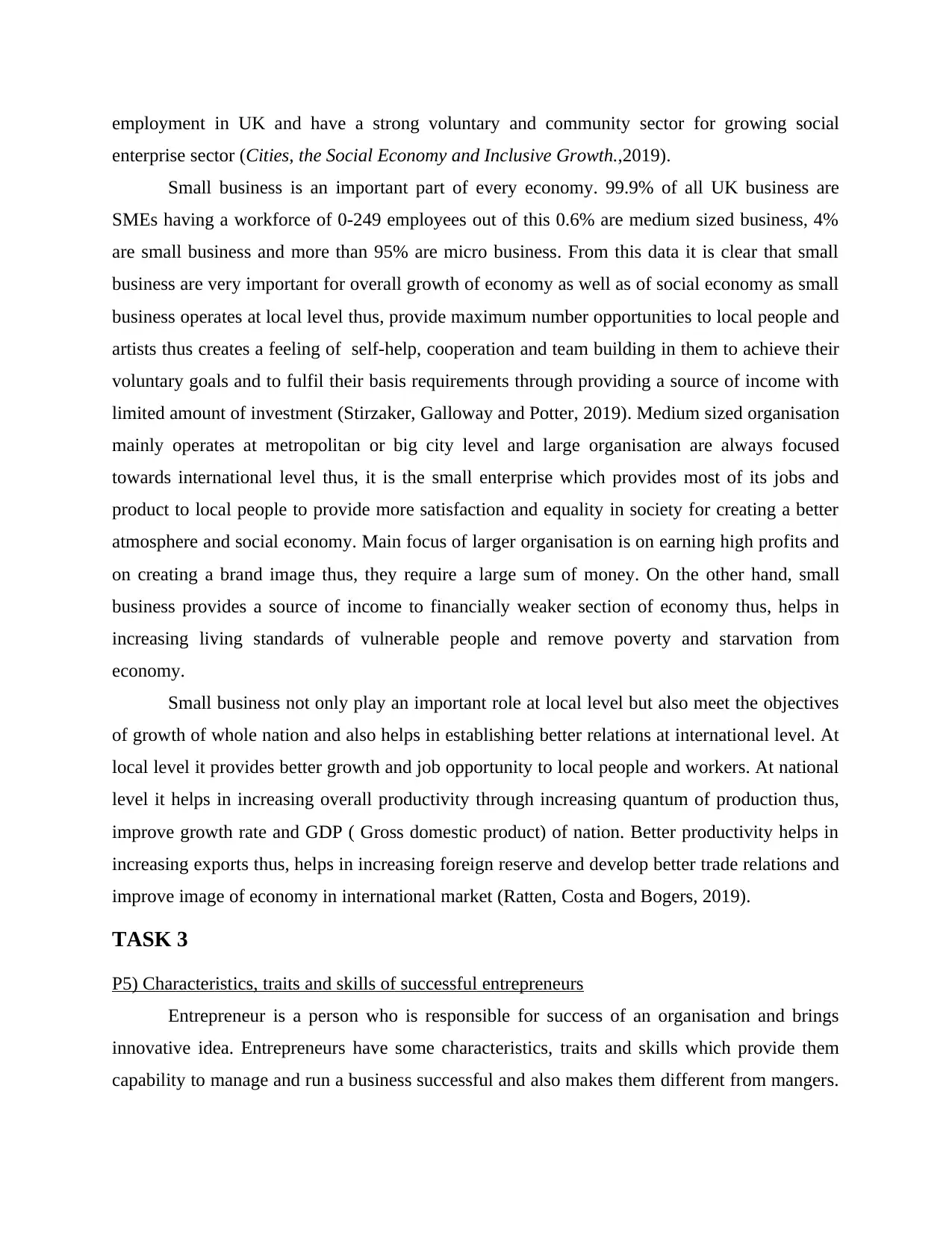
employment in UK and have a strong voluntary and community sector for growing social
enterprise sector (Cities, the Social Economy and Inclusive Growth.,2019).
Small business is an important part of every economy. 99.9% of all UK business are
SMEs having a workforce of 0-249 employees out of this 0.6% are medium sized business, 4%
are small business and more than 95% are micro business. From this data it is clear that small
business are very important for overall growth of economy as well as of social economy as small
business operates at local level thus, provide maximum number opportunities to local people and
artists thus creates a feeling of self-help, cooperation and team building in them to achieve their
voluntary goals and to fulfil their basis requirements through providing a source of income with
limited amount of investment (Stirzaker, Galloway and Potter, 2019). Medium sized organisation
mainly operates at metropolitan or big city level and large organisation are always focused
towards international level thus, it is the small enterprise which provides most of its jobs and
product to local people to provide more satisfaction and equality in society for creating a better
atmosphere and social economy. Main focus of larger organisation is on earning high profits and
on creating a brand image thus, they require a large sum of money. On the other hand, small
business provides a source of income to financially weaker section of economy thus, helps in
increasing living standards of vulnerable people and remove poverty and starvation from
economy.
Small business not only play an important role at local level but also meet the objectives
of growth of whole nation and also helps in establishing better relations at international level. At
local level it provides better growth and job opportunity to local people and workers. At national
level it helps in increasing overall productivity through increasing quantum of production thus,
improve growth rate and GDP ( Gross domestic product) of nation. Better productivity helps in
increasing exports thus, helps in increasing foreign reserve and develop better trade relations and
improve image of economy in international market (Ratten, Costa and Bogers, 2019).
TASK 3
P5) Characteristics, traits and skills of successful entrepreneurs
Entrepreneur is a person who is responsible for success of an organisation and brings
innovative idea. Entrepreneurs have some characteristics, traits and skills which provide them
capability to manage and run a business successful and also makes them different from mangers.
enterprise sector (Cities, the Social Economy and Inclusive Growth.,2019).
Small business is an important part of every economy. 99.9% of all UK business are
SMEs having a workforce of 0-249 employees out of this 0.6% are medium sized business, 4%
are small business and more than 95% are micro business. From this data it is clear that small
business are very important for overall growth of economy as well as of social economy as small
business operates at local level thus, provide maximum number opportunities to local people and
artists thus creates a feeling of self-help, cooperation and team building in them to achieve their
voluntary goals and to fulfil their basis requirements through providing a source of income with
limited amount of investment (Stirzaker, Galloway and Potter, 2019). Medium sized organisation
mainly operates at metropolitan or big city level and large organisation are always focused
towards international level thus, it is the small enterprise which provides most of its jobs and
product to local people to provide more satisfaction and equality in society for creating a better
atmosphere and social economy. Main focus of larger organisation is on earning high profits and
on creating a brand image thus, they require a large sum of money. On the other hand, small
business provides a source of income to financially weaker section of economy thus, helps in
increasing living standards of vulnerable people and remove poverty and starvation from
economy.
Small business not only play an important role at local level but also meet the objectives
of growth of whole nation and also helps in establishing better relations at international level. At
local level it provides better growth and job opportunity to local people and workers. At national
level it helps in increasing overall productivity through increasing quantum of production thus,
improve growth rate and GDP ( Gross domestic product) of nation. Better productivity helps in
increasing exports thus, helps in increasing foreign reserve and develop better trade relations and
improve image of economy in international market (Ratten, Costa and Bogers, 2019).
TASK 3
P5) Characteristics, traits and skills of successful entrepreneurs
Entrepreneur is a person who is responsible for success of an organisation and brings
innovative idea. Entrepreneurs have some characteristics, traits and skills which provide them
capability to manage and run a business successful and also makes them different from mangers.
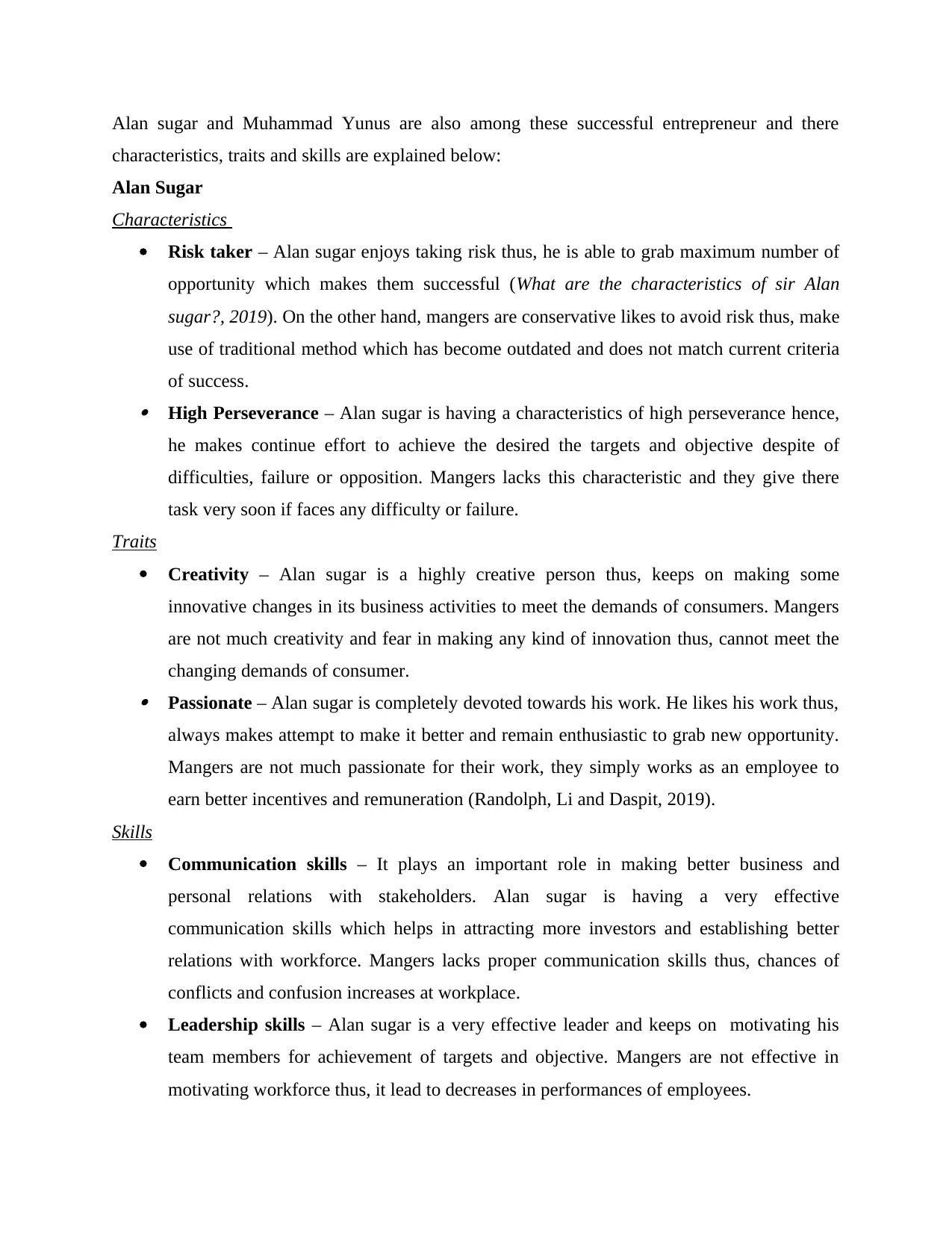
Alan sugar and Muhammad Yunus are also among these successful entrepreneur and there
characteristics, traits and skills are explained below:
Alan Sugar
Characteristics
Risk taker – Alan sugar enjoys taking risk thus, he is able to grab maximum number of
opportunity which makes them successful (What are the characteristics of sir Alan
sugar?, 2019). On the other hand, mangers are conservative likes to avoid risk thus, make
use of traditional method which has become outdated and does not match current criteria
of success. High Perseverance – Alan sugar is having a characteristics of high perseverance hence,
he makes continue effort to achieve the desired the targets and objective despite of
difficulties, failure or opposition. Mangers lacks this characteristic and they give there
task very soon if faces any difficulty or failure.
Traits
Creativity – Alan sugar is a highly creative person thus, keeps on making some
innovative changes in its business activities to meet the demands of consumers. Mangers
are not much creativity and fear in making any kind of innovation thus, cannot meet the
changing demands of consumer. Passionate – Alan sugar is completely devoted towards his work. He likes his work thus,
always makes attempt to make it better and remain enthusiastic to grab new opportunity.
Mangers are not much passionate for their work, they simply works as an employee to
earn better incentives and remuneration (Randolph, Li and Daspit, 2019).
Skills
Communication skills – It plays an important role in making better business and
personal relations with stakeholders. Alan sugar is having a very effective
communication skills which helps in attracting more investors and establishing better
relations with workforce. Mangers lacks proper communication skills thus, chances of
conflicts and confusion increases at workplace.
Leadership skills – Alan sugar is a very effective leader and keeps on motivating his
team members for achievement of targets and objective. Mangers are not effective in
motivating workforce thus, it lead to decreases in performances of employees.
characteristics, traits and skills are explained below:
Alan Sugar
Characteristics
Risk taker – Alan sugar enjoys taking risk thus, he is able to grab maximum number of
opportunity which makes them successful (What are the characteristics of sir Alan
sugar?, 2019). On the other hand, mangers are conservative likes to avoid risk thus, make
use of traditional method which has become outdated and does not match current criteria
of success. High Perseverance – Alan sugar is having a characteristics of high perseverance hence,
he makes continue effort to achieve the desired the targets and objective despite of
difficulties, failure or opposition. Mangers lacks this characteristic and they give there
task very soon if faces any difficulty or failure.
Traits
Creativity – Alan sugar is a highly creative person thus, keeps on making some
innovative changes in its business activities to meet the demands of consumers. Mangers
are not much creativity and fear in making any kind of innovation thus, cannot meet the
changing demands of consumer. Passionate – Alan sugar is completely devoted towards his work. He likes his work thus,
always makes attempt to make it better and remain enthusiastic to grab new opportunity.
Mangers are not much passionate for their work, they simply works as an employee to
earn better incentives and remuneration (Randolph, Li and Daspit, 2019).
Skills
Communication skills – It plays an important role in making better business and
personal relations with stakeholders. Alan sugar is having a very effective
communication skills which helps in attracting more investors and establishing better
relations with workforce. Mangers lacks proper communication skills thus, chances of
conflicts and confusion increases at workplace.
Leadership skills – Alan sugar is a very effective leader and keeps on motivating his
team members for achievement of targets and objective. Mangers are not effective in
motivating workforce thus, it lead to decreases in performances of employees.
Secure Best Marks with AI Grader
Need help grading? Try our AI Grader for instant feedback on your assignments.
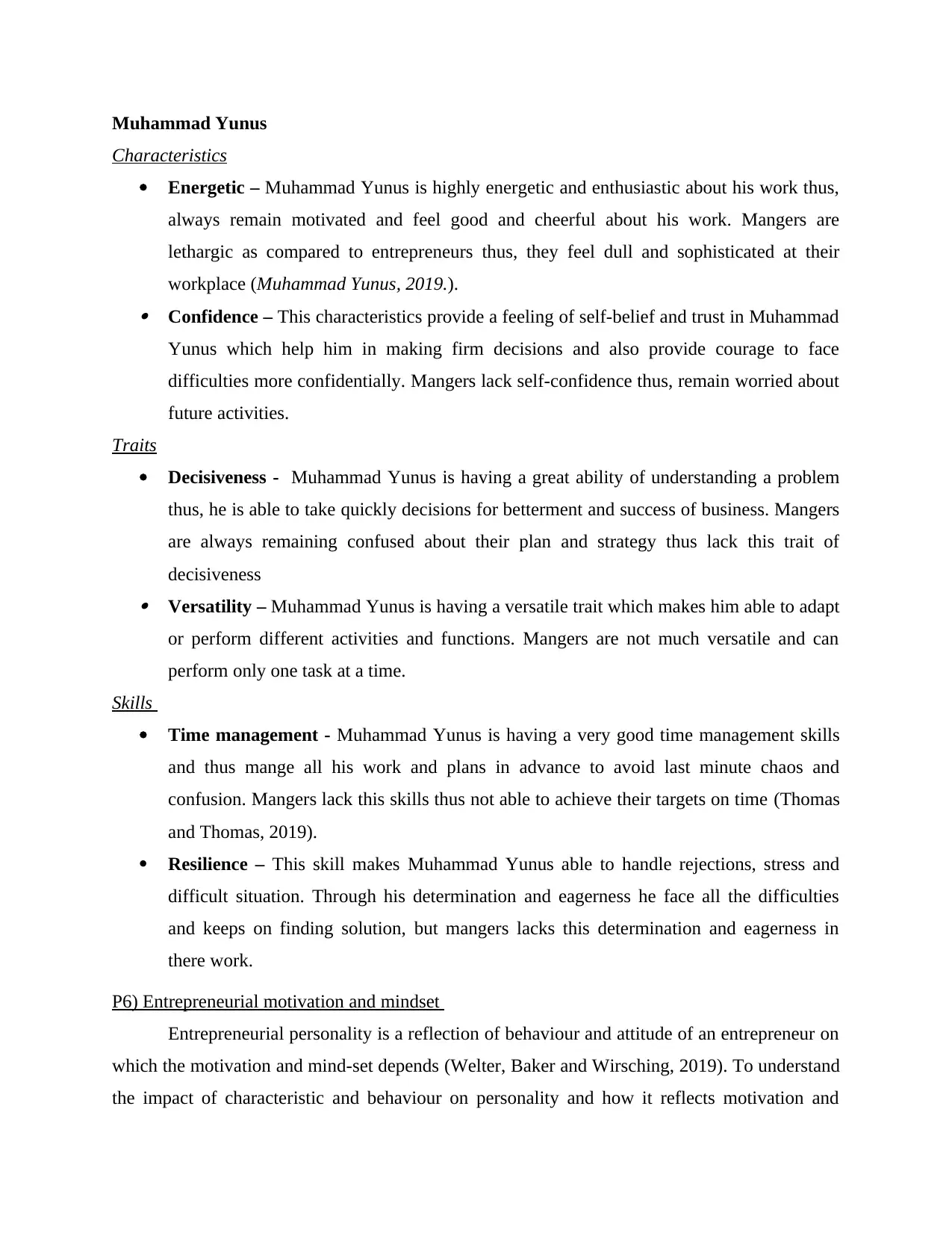
Muhammad Yunus
Characteristics
Energetic – Muhammad Yunus is highly energetic and enthusiastic about his work thus,
always remain motivated and feel good and cheerful about his work. Mangers are
lethargic as compared to entrepreneurs thus, they feel dull and sophisticated at their
workplace (Muhammad Yunus, 2019.). Confidence – This characteristics provide a feeling of self-belief and trust in Muhammad
Yunus which help him in making firm decisions and also provide courage to face
difficulties more confidentially. Mangers lack self-confidence thus, remain worried about
future activities.
Traits
Decisiveness - Muhammad Yunus is having a great ability of understanding a problem
thus, he is able to take quickly decisions for betterment and success of business. Mangers
are always remaining confused about their plan and strategy thus lack this trait of
decisiveness Versatility – Muhammad Yunus is having a versatile trait which makes him able to adapt
or perform different activities and functions. Mangers are not much versatile and can
perform only one task at a time.
Skills
Time management - Muhammad Yunus is having a very good time management skills
and thus mange all his work and plans in advance to avoid last minute chaos and
confusion. Mangers lack this skills thus not able to achieve their targets on time (Thomas
and Thomas, 2019).
Resilience – This skill makes Muhammad Yunus able to handle rejections, stress and
difficult situation. Through his determination and eagerness he face all the difficulties
and keeps on finding solution, but mangers lacks this determination and eagerness in
there work.
P6) Entrepreneurial motivation and mindset
Entrepreneurial personality is a reflection of behaviour and attitude of an entrepreneur on
which the motivation and mind-set depends (Welter, Baker and Wirsching, 2019). To understand
the impact of characteristic and behaviour on personality and how it reflects motivation and
Characteristics
Energetic – Muhammad Yunus is highly energetic and enthusiastic about his work thus,
always remain motivated and feel good and cheerful about his work. Mangers are
lethargic as compared to entrepreneurs thus, they feel dull and sophisticated at their
workplace (Muhammad Yunus, 2019.). Confidence – This characteristics provide a feeling of self-belief and trust in Muhammad
Yunus which help him in making firm decisions and also provide courage to face
difficulties more confidentially. Mangers lack self-confidence thus, remain worried about
future activities.
Traits
Decisiveness - Muhammad Yunus is having a great ability of understanding a problem
thus, he is able to take quickly decisions for betterment and success of business. Mangers
are always remaining confused about their plan and strategy thus lack this trait of
decisiveness Versatility – Muhammad Yunus is having a versatile trait which makes him able to adapt
or perform different activities and functions. Mangers are not much versatile and can
perform only one task at a time.
Skills
Time management - Muhammad Yunus is having a very good time management skills
and thus mange all his work and plans in advance to avoid last minute chaos and
confusion. Mangers lack this skills thus not able to achieve their targets on time (Thomas
and Thomas, 2019).
Resilience – This skill makes Muhammad Yunus able to handle rejections, stress and
difficult situation. Through his determination and eagerness he face all the difficulties
and keeps on finding solution, but mangers lacks this determination and eagerness in
there work.
P6) Entrepreneurial motivation and mindset
Entrepreneurial personality is a reflection of behaviour and attitude of an entrepreneur on
which the motivation and mind-set depends (Welter, Baker and Wirsching, 2019). To understand
the impact of characteristic and behaviour on personality and how it reflects motivation and
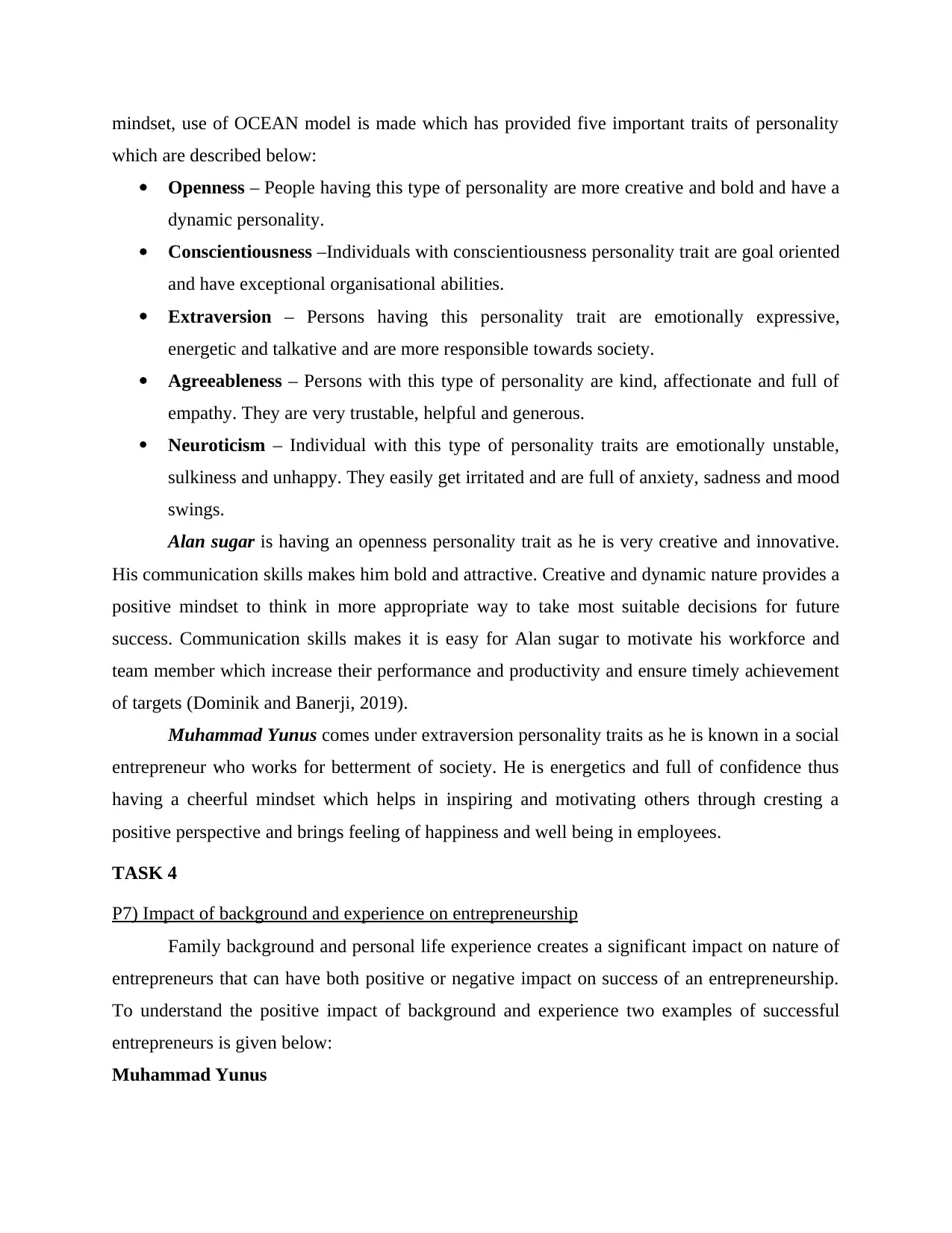
mindset, use of OCEAN model is made which has provided five important traits of personality
which are described below:
Openness – People having this type of personality are more creative and bold and have a
dynamic personality.
Conscientiousness –Individuals with conscientiousness personality trait are goal oriented
and have exceptional organisational abilities.
Extraversion – Persons having this personality trait are emotionally expressive,
energetic and talkative and are more responsible towards society.
Agreeableness – Persons with this type of personality are kind, affectionate and full of
empathy. They are very trustable, helpful and generous.
Neuroticism – Individual with this type of personality traits are emotionally unstable,
sulkiness and unhappy. They easily get irritated and are full of anxiety, sadness and mood
swings.
Alan sugar is having an openness personality trait as he is very creative and innovative.
His communication skills makes him bold and attractive. Creative and dynamic nature provides a
positive mindset to think in more appropriate way to take most suitable decisions for future
success. Communication skills makes it is easy for Alan sugar to motivate his workforce and
team member which increase their performance and productivity and ensure timely achievement
of targets (Dominik and Banerji, 2019).
Muhammad Yunus comes under extraversion personality traits as he is known in a social
entrepreneur who works for betterment of society. He is energetics and full of confidence thus
having a cheerful mindset which helps in inspiring and motivating others through cresting a
positive perspective and brings feeling of happiness and well being in employees.
TASK 4
P7) Impact of background and experience on entrepreneurship
Family background and personal life experience creates a significant impact on nature of
entrepreneurs that can have both positive or negative impact on success of an entrepreneurship.
To understand the positive impact of background and experience two examples of successful
entrepreneurs is given below:
Muhammad Yunus
which are described below:
Openness – People having this type of personality are more creative and bold and have a
dynamic personality.
Conscientiousness –Individuals with conscientiousness personality trait are goal oriented
and have exceptional organisational abilities.
Extraversion – Persons having this personality trait are emotionally expressive,
energetic and talkative and are more responsible towards society.
Agreeableness – Persons with this type of personality are kind, affectionate and full of
empathy. They are very trustable, helpful and generous.
Neuroticism – Individual with this type of personality traits are emotionally unstable,
sulkiness and unhappy. They easily get irritated and are full of anxiety, sadness and mood
swings.
Alan sugar is having an openness personality trait as he is very creative and innovative.
His communication skills makes him bold and attractive. Creative and dynamic nature provides a
positive mindset to think in more appropriate way to take most suitable decisions for future
success. Communication skills makes it is easy for Alan sugar to motivate his workforce and
team member which increase their performance and productivity and ensure timely achievement
of targets (Dominik and Banerji, 2019).
Muhammad Yunus comes under extraversion personality traits as he is known in a social
entrepreneur who works for betterment of society. He is energetics and full of confidence thus
having a cheerful mindset which helps in inspiring and motivating others through cresting a
positive perspective and brings feeling of happiness and well being in employees.
TASK 4
P7) Impact of background and experience on entrepreneurship
Family background and personal life experience creates a significant impact on nature of
entrepreneurs that can have both positive or negative impact on success of an entrepreneurship.
To understand the positive impact of background and experience two examples of successful
entrepreneurs is given below:
Muhammad Yunus
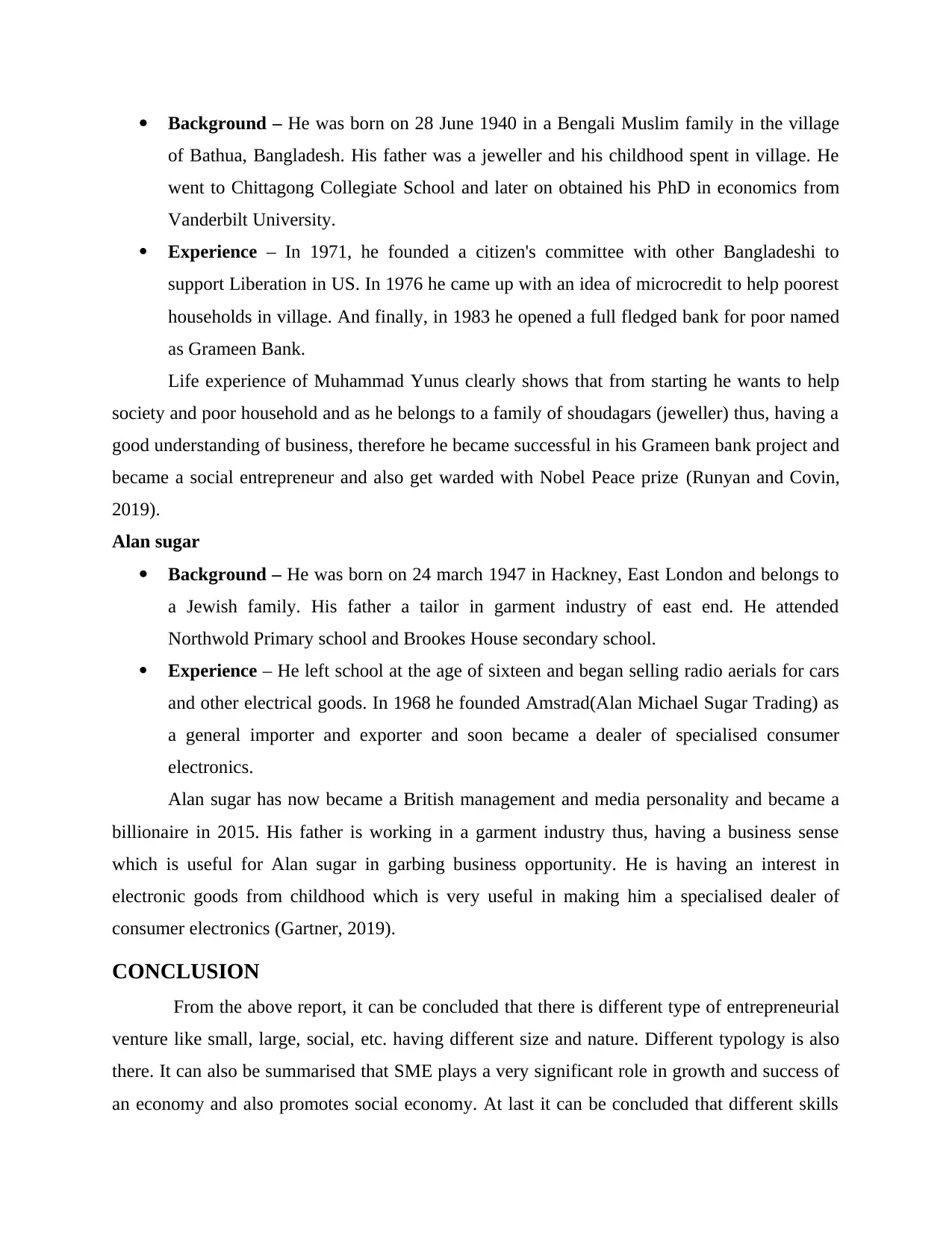
Background – He was born on 28 June 1940 in a Bengali Muslim family in the village
of Bathua, Bangladesh. His father was a jeweller and his childhood spent in village. He
went to Chittagong Collegiate School and later on obtained his PhD in economics from
Vanderbilt University.
Experience – In 1971, he founded a citizen's committee with other Bangladeshi to
support Liberation in US. In 1976 he came up with an idea of microcredit to help poorest
households in village. And finally, in 1983 he opened a full fledged bank for poor named
as Grameen Bank.
Life experience of Muhammad Yunus clearly shows that from starting he wants to help
society and poor household and as he belongs to a family of shoudagars (jeweller) thus, having a
good understanding of business, therefore he became successful in his Grameen bank project and
became a social entrepreneur and also get warded with Nobel Peace prize (Runyan and Covin,
2019).
Alan sugar
Background – He was born on 24 march 1947 in Hackney, East London and belongs to
a Jewish family. His father a tailor in garment industry of east end. He attended
Northwold Primary school and Brookes House secondary school.
Experience – He left school at the age of sixteen and began selling radio aerials for cars
and other electrical goods. In 1968 he founded Amstrad(Alan Michael Sugar Trading) as
a general importer and exporter and soon became a dealer of specialised consumer
electronics.
Alan sugar has now became a British management and media personality and became a
billionaire in 2015. His father is working in a garment industry thus, having a business sense
which is useful for Alan sugar in garbing business opportunity. He is having an interest in
electronic goods from childhood which is very useful in making him a specialised dealer of
consumer electronics (Gartner, 2019).
CONCLUSION
From the above report, it can be concluded that there is different type of entrepreneurial
venture like small, large, social, etc. having different size and nature. Different typology is also
there. It can also be summarised that SME plays a very significant role in growth and success of
an economy and also promotes social economy. At last it can be concluded that different skills
of Bathua, Bangladesh. His father was a jeweller and his childhood spent in village. He
went to Chittagong Collegiate School and later on obtained his PhD in economics from
Vanderbilt University.
Experience – In 1971, he founded a citizen's committee with other Bangladeshi to
support Liberation in US. In 1976 he came up with an idea of microcredit to help poorest
households in village. And finally, in 1983 he opened a full fledged bank for poor named
as Grameen Bank.
Life experience of Muhammad Yunus clearly shows that from starting he wants to help
society and poor household and as he belongs to a family of shoudagars (jeweller) thus, having a
good understanding of business, therefore he became successful in his Grameen bank project and
became a social entrepreneur and also get warded with Nobel Peace prize (Runyan and Covin,
2019).
Alan sugar
Background – He was born on 24 march 1947 in Hackney, East London and belongs to
a Jewish family. His father a tailor in garment industry of east end. He attended
Northwold Primary school and Brookes House secondary school.
Experience – He left school at the age of sixteen and began selling radio aerials for cars
and other electrical goods. In 1968 he founded Amstrad(Alan Michael Sugar Trading) as
a general importer and exporter and soon became a dealer of specialised consumer
electronics.
Alan sugar has now became a British management and media personality and became a
billionaire in 2015. His father is working in a garment industry thus, having a business sense
which is useful for Alan sugar in garbing business opportunity. He is having an interest in
electronic goods from childhood which is very useful in making him a specialised dealer of
consumer electronics (Gartner, 2019).
CONCLUSION
From the above report, it can be concluded that there is different type of entrepreneurial
venture like small, large, social, etc. having different size and nature. Different typology is also
there. It can also be summarised that SME plays a very significant role in growth and success of
an economy and also promotes social economy. At last it can be concluded that different skills
Paraphrase This Document
Need a fresh take? Get an instant paraphrase of this document with our AI Paraphraser

and traits of entrepreneurs are there which makes them successful and different from other
mangers. Background and personal experience also plays a significant role in success and failure
of an entrepreneurship.
mangers. Background and personal experience also plays a significant role in success and failure
of an entrepreneurship.
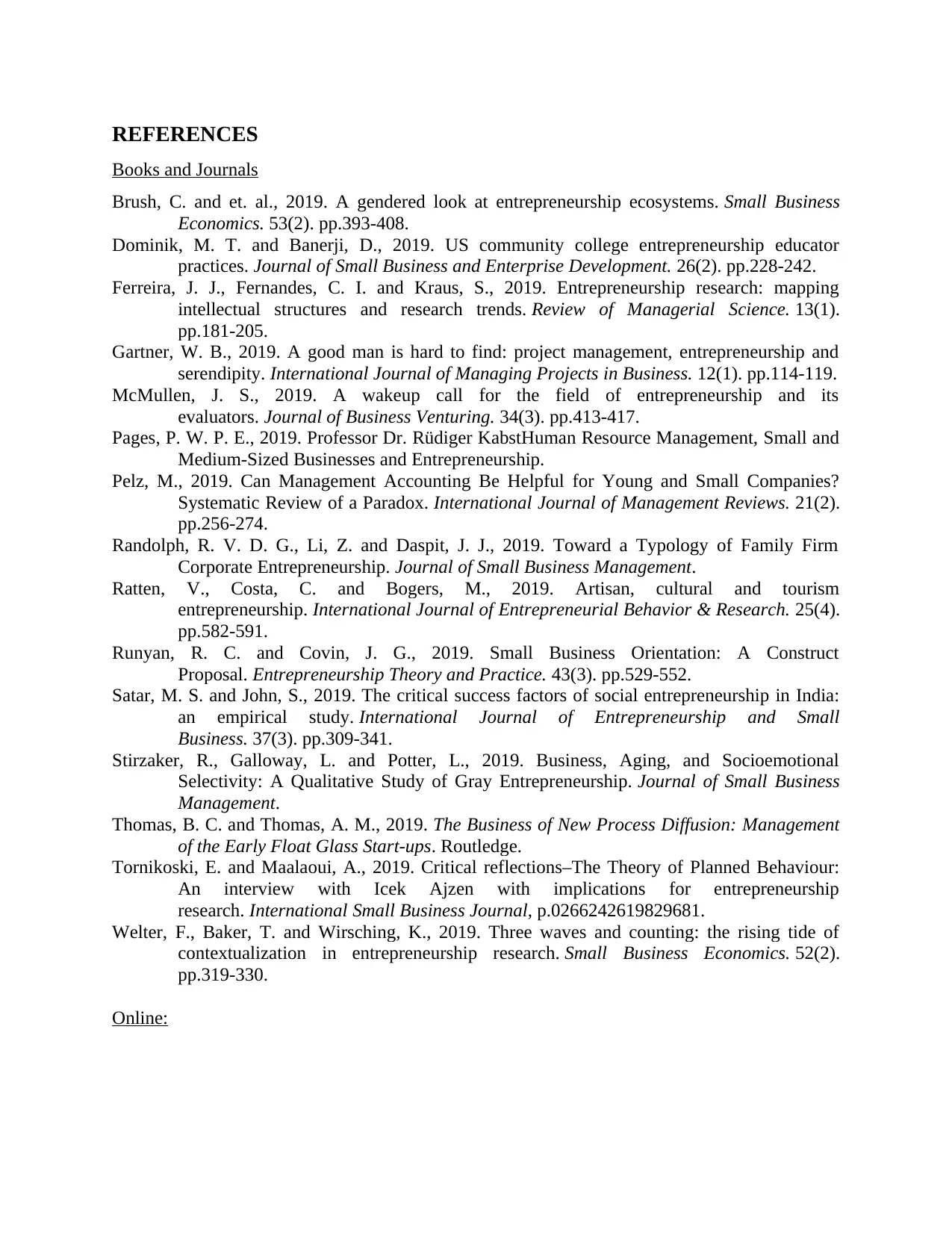
REFERENCES
Books and Journals
Brush, C. and et. al., 2019. A gendered look at entrepreneurship ecosystems. Small Business
Economics. 53(2). pp.393-408.
Dominik, M. T. and Banerji, D., 2019. US community college entrepreneurship educator
practices. Journal of Small Business and Enterprise Development. 26(2). pp.228-242.
Ferreira, J. J., Fernandes, C. I. and Kraus, S., 2019. Entrepreneurship research: mapping
intellectual structures and research trends. Review of Managerial Science. 13(1).
pp.181-205.
Gartner, W. B., 2019. A good man is hard to find: project management, entrepreneurship and
serendipity. International Journal of Managing Projects in Business. 12(1). pp.114-119.
McMullen, J. S., 2019. A wakeup call for the field of entrepreneurship and its
evaluators. Journal of Business Venturing. 34(3). pp.413-417.
Pages, P. W. P. E., 2019. Professor Dr. Rüdiger KabstHuman Resource Management, Small and
Medium-Sized Businesses and Entrepreneurship.
Pelz, M., 2019. Can Management Accounting Be Helpful for Young and Small Companies?
Systematic Review of a Paradox. International Journal of Management Reviews. 21(2).
pp.256-274.
Randolph, R. V. D. G., Li, Z. and Daspit, J. J., 2019. Toward a Typology of Family Firm
Corporate Entrepreneurship. Journal of Small Business Management.
Ratten, V., Costa, C. and Bogers, M., 2019. Artisan, cultural and tourism
entrepreneurship. International Journal of Entrepreneurial Behavior & Research. 25(4).
pp.582-591.
Runyan, R. C. and Covin, J. G., 2019. Small Business Orientation: A Construct
Proposal. Entrepreneurship Theory and Practice. 43(3). pp.529-552.
Satar, M. S. and John, S., 2019. The critical success factors of social entrepreneurship in India:
an empirical study. International Journal of Entrepreneurship and Small
Business. 37(3). pp.309-341.
Stirzaker, R., Galloway, L. and Potter, L., 2019. Business, Aging, and Socioemotional
Selectivity: A Qualitative Study of Gray Entrepreneurship. Journal of Small Business
Management.
Thomas, B. C. and Thomas, A. M., 2019. The Business of New Process Diffusion: Management
of the Early Float Glass Start-ups. Routledge.
Tornikoski, E. and Maalaoui, A., 2019. Critical reflections–The Theory of Planned Behaviour:
An interview with Icek Ajzen with implications for entrepreneurship
research. International Small Business Journal, p.0266242619829681.
Welter, F., Baker, T. and Wirsching, K., 2019. Three waves and counting: the rising tide of
contextualization in entrepreneurship research. Small Business Economics. 52(2).
pp.319-330.
Online:
Books and Journals
Brush, C. and et. al., 2019. A gendered look at entrepreneurship ecosystems. Small Business
Economics. 53(2). pp.393-408.
Dominik, M. T. and Banerji, D., 2019. US community college entrepreneurship educator
practices. Journal of Small Business and Enterprise Development. 26(2). pp.228-242.
Ferreira, J. J., Fernandes, C. I. and Kraus, S., 2019. Entrepreneurship research: mapping
intellectual structures and research trends. Review of Managerial Science. 13(1).
pp.181-205.
Gartner, W. B., 2019. A good man is hard to find: project management, entrepreneurship and
serendipity. International Journal of Managing Projects in Business. 12(1). pp.114-119.
McMullen, J. S., 2019. A wakeup call for the field of entrepreneurship and its
evaluators. Journal of Business Venturing. 34(3). pp.413-417.
Pages, P. W. P. E., 2019. Professor Dr. Rüdiger KabstHuman Resource Management, Small and
Medium-Sized Businesses and Entrepreneurship.
Pelz, M., 2019. Can Management Accounting Be Helpful for Young and Small Companies?
Systematic Review of a Paradox. International Journal of Management Reviews. 21(2).
pp.256-274.
Randolph, R. V. D. G., Li, Z. and Daspit, J. J., 2019. Toward a Typology of Family Firm
Corporate Entrepreneurship. Journal of Small Business Management.
Ratten, V., Costa, C. and Bogers, M., 2019. Artisan, cultural and tourism
entrepreneurship. International Journal of Entrepreneurial Behavior & Research. 25(4).
pp.582-591.
Runyan, R. C. and Covin, J. G., 2019. Small Business Orientation: A Construct
Proposal. Entrepreneurship Theory and Practice. 43(3). pp.529-552.
Satar, M. S. and John, S., 2019. The critical success factors of social entrepreneurship in India:
an empirical study. International Journal of Entrepreneurship and Small
Business. 37(3). pp.309-341.
Stirzaker, R., Galloway, L. and Potter, L., 2019. Business, Aging, and Socioemotional
Selectivity: A Qualitative Study of Gray Entrepreneurship. Journal of Small Business
Management.
Thomas, B. C. and Thomas, A. M., 2019. The Business of New Process Diffusion: Management
of the Early Float Glass Start-ups. Routledge.
Tornikoski, E. and Maalaoui, A., 2019. Critical reflections–The Theory of Planned Behaviour:
An interview with Icek Ajzen with implications for entrepreneurship
research. International Small Business Journal, p.0266242619829681.
Welter, F., Baker, T. and Wirsching, K., 2019. Three waves and counting: the rising tide of
contextualization in entrepreneurship research. Small Business Economics. 52(2).
pp.319-330.
Online:
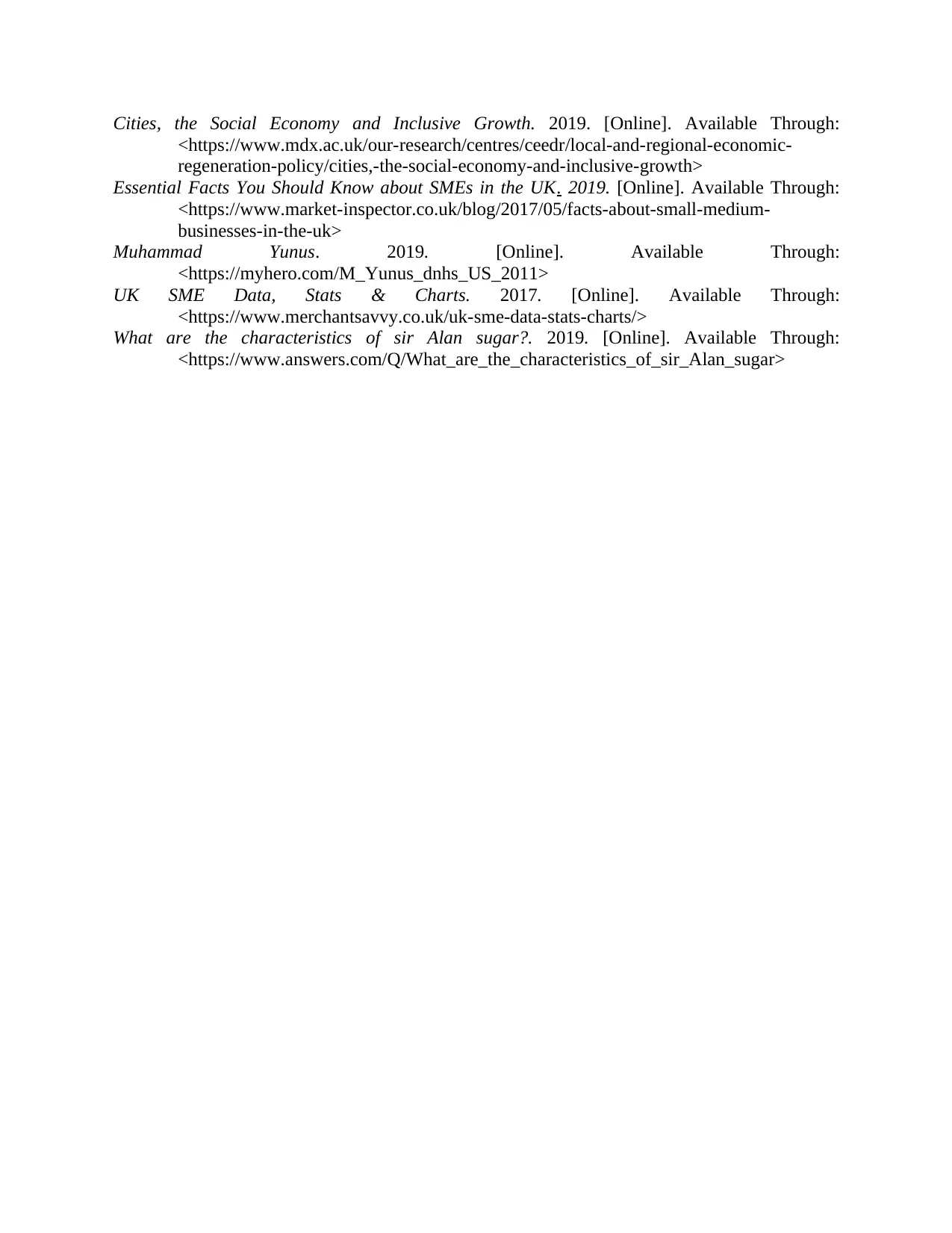
Cities, the Social Economy and Inclusive Growth. 2019. [Online]. Available Through:
<https://www.mdx.ac.uk/our-research/centres/ceedr/local-and-regional-economic-
regeneration-policy/cities,-the-social-economy-and-inclusive-growth>
Essential Facts You Should Know about SMEs in the UK. 2019. [Online]. Available Through:
<https://www.market-inspector.co.uk/blog/2017/05/facts-about-small-medium-
businesses-in-the-uk>
Muhammad Yunus. 2019. [Online]. Available Through:
<https://myhero.com/M_Yunus_dnhs_US_2011>
UK SME Data, Stats & Charts. 2017. [Online]. Available Through:
<https://www.merchantsavvy.co.uk/uk-sme-data-stats-charts/>
What are the characteristics of sir Alan sugar?. 2019. [Online]. Available Through:
<https://www.answers.com/Q/What_are_the_characteristics_of_sir_Alan_sugar>
<https://www.mdx.ac.uk/our-research/centres/ceedr/local-and-regional-economic-
regeneration-policy/cities,-the-social-economy-and-inclusive-growth>
Essential Facts You Should Know about SMEs in the UK. 2019. [Online]. Available Through:
<https://www.market-inspector.co.uk/blog/2017/05/facts-about-small-medium-
businesses-in-the-uk>
Muhammad Yunus. 2019. [Online]. Available Through:
<https://myhero.com/M_Yunus_dnhs_US_2011>
UK SME Data, Stats & Charts. 2017. [Online]. Available Through:
<https://www.merchantsavvy.co.uk/uk-sme-data-stats-charts/>
What are the characteristics of sir Alan sugar?. 2019. [Online]. Available Through:
<https://www.answers.com/Q/What_are_the_characteristics_of_sir_Alan_sugar>
1 out of 16
Related Documents
Your All-in-One AI-Powered Toolkit for Academic Success.
+13062052269
info@desklib.com
Available 24*7 on WhatsApp / Email
![[object Object]](/_next/static/media/star-bottom.7253800d.svg)
Unlock your academic potential
© 2024 | Zucol Services PVT LTD | All rights reserved.





